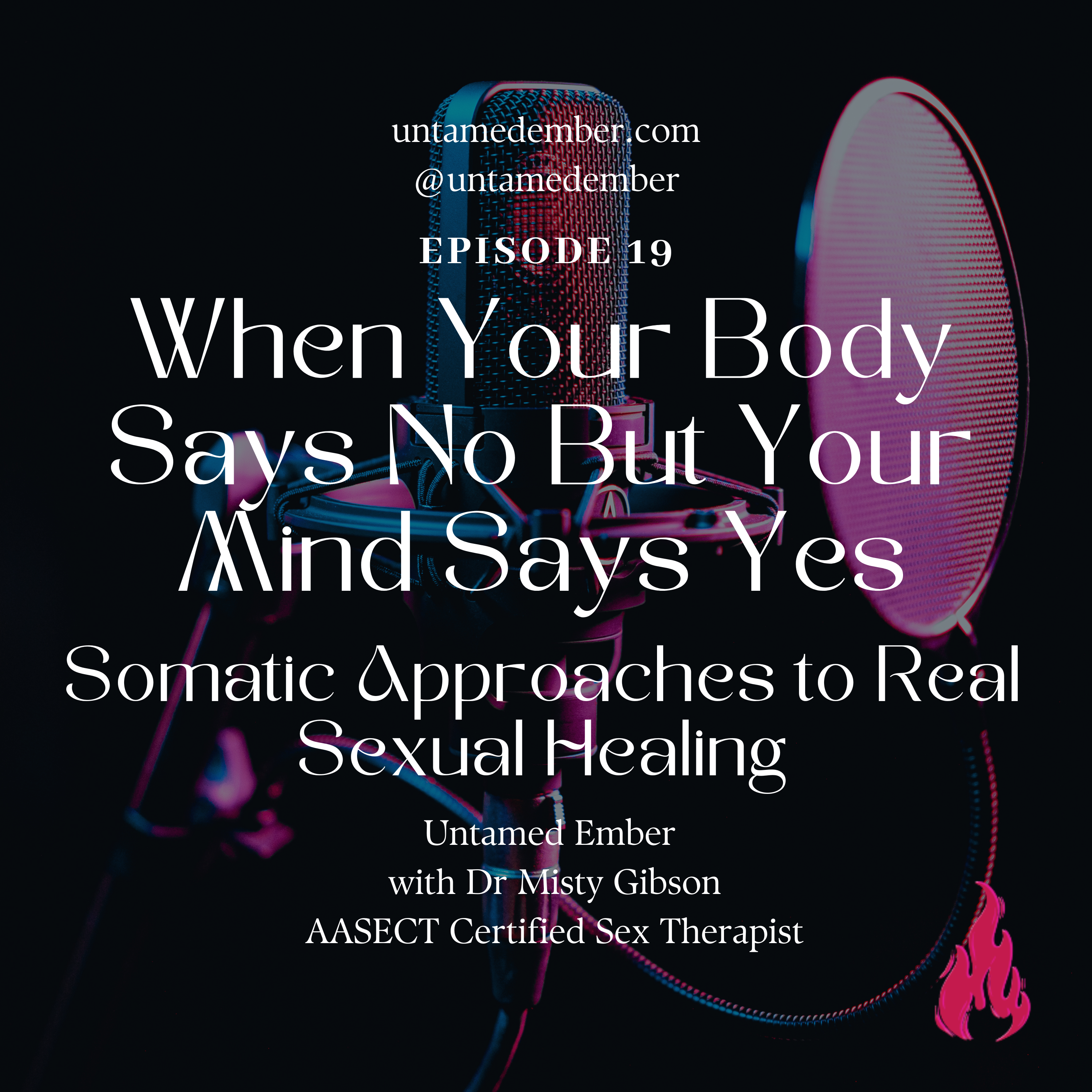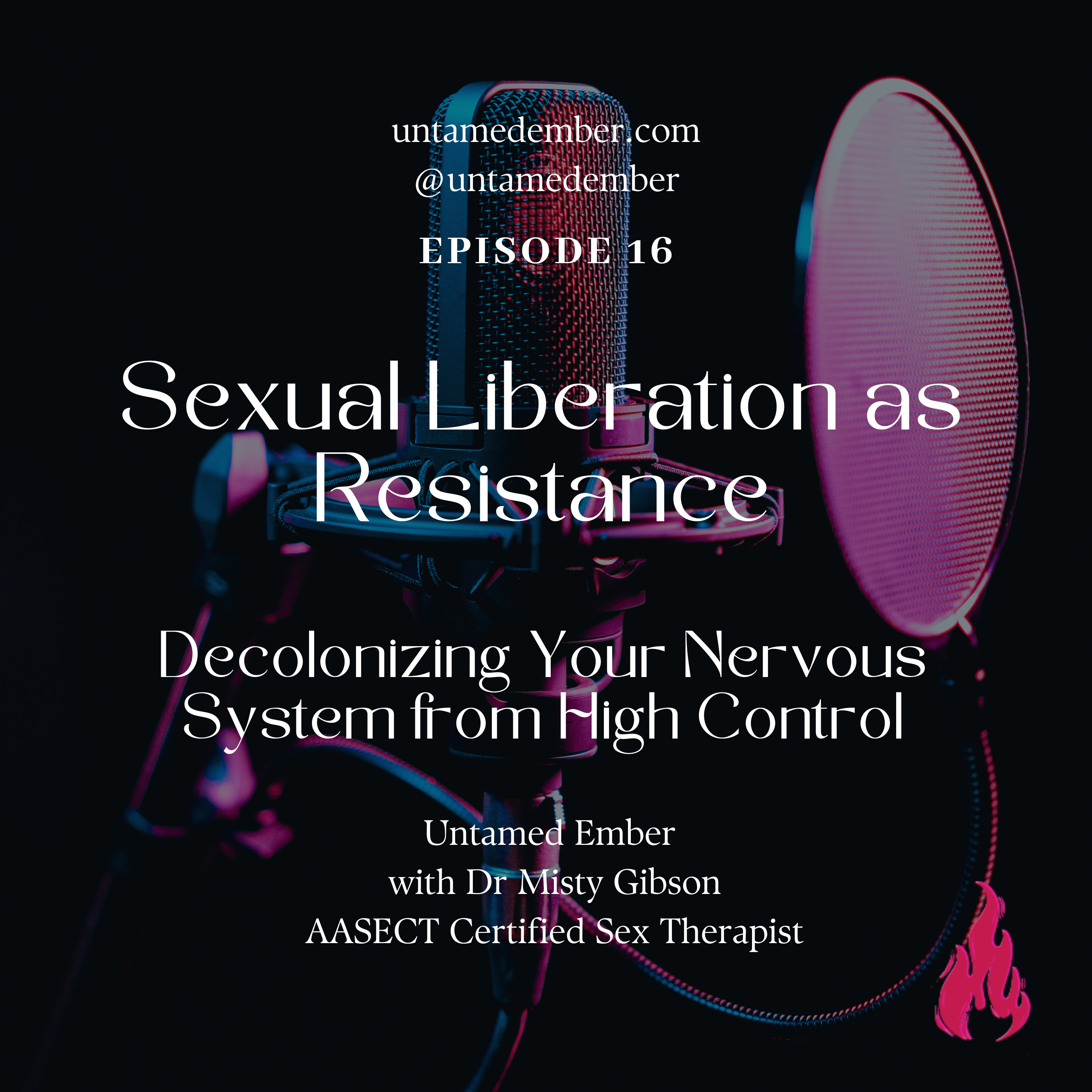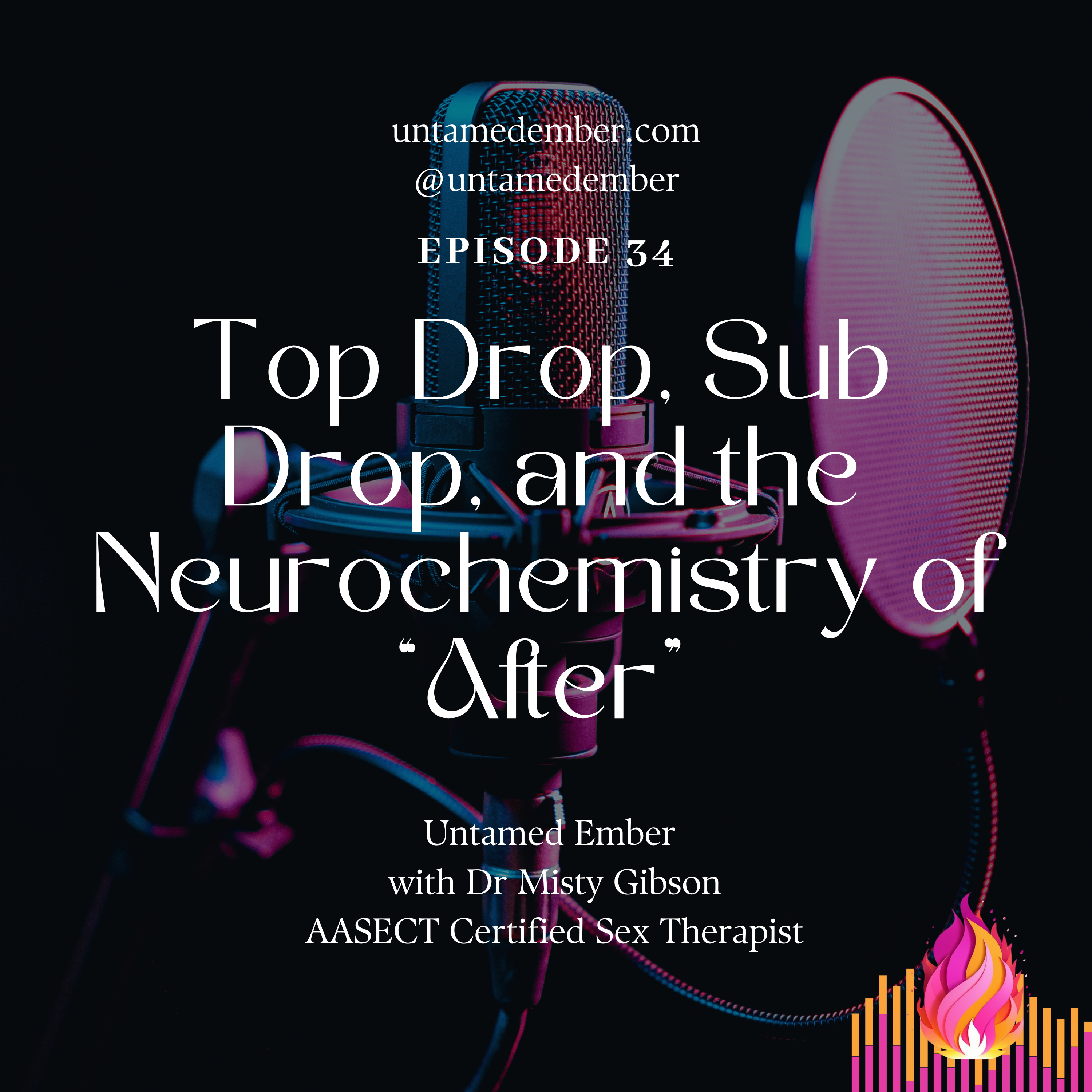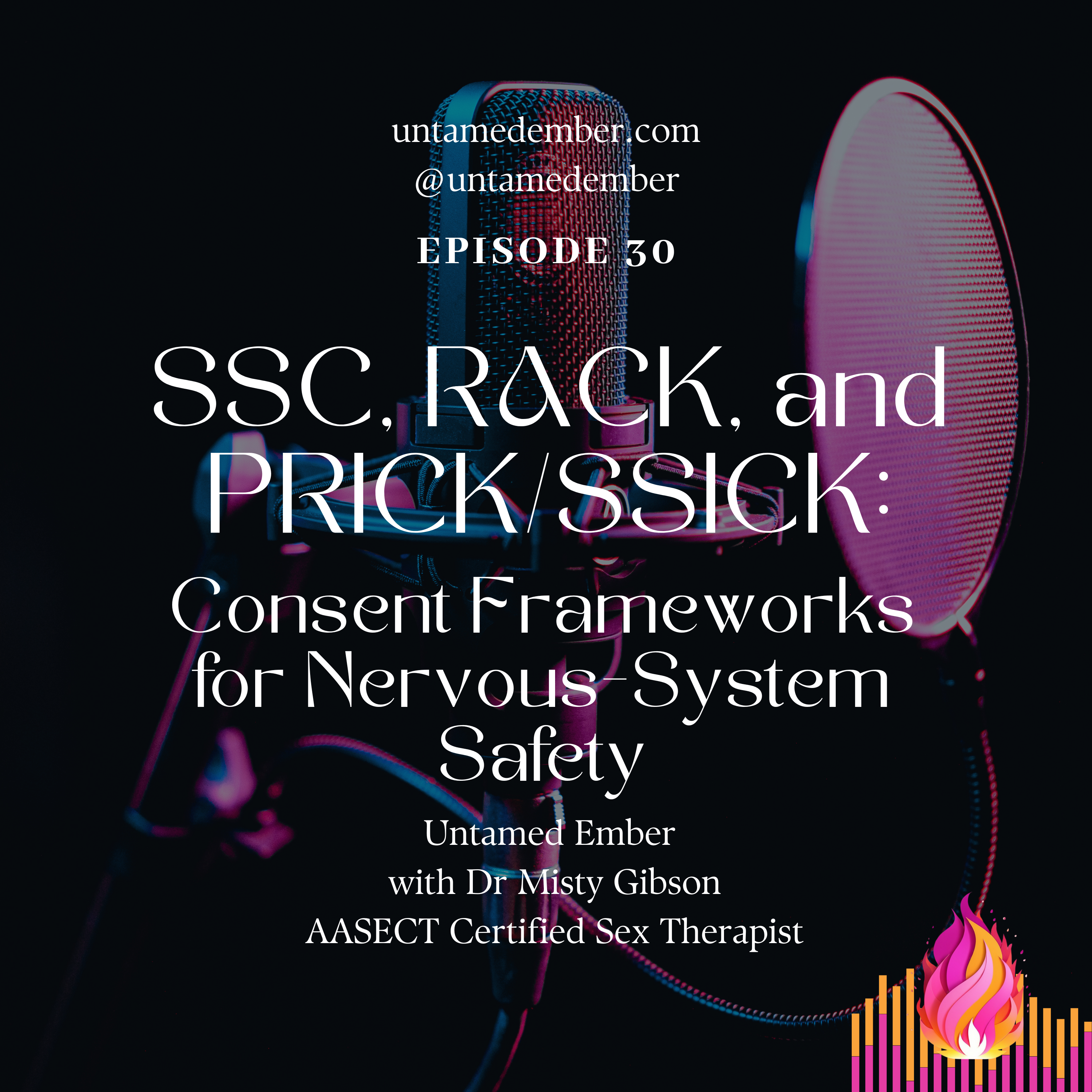Episode Transcript
[00:00:02] So there I was, explaining to my therapist why I kept tensing up during sex with partners I absolutely adored, and she asked me this question that completely broke my brain.
[00:00:14] What if your body isn't the problem? What if it's the only one in the room telling the truth?
[00:00:19] Excuse me. What now?
[00:00:21] Because here's the thing nobody warns you about. You can be horny as hell, mentally ready to get down and dirty, completely attracted to your partner, and your body can still decide to cosplay as a Victorian maiden having the vapors. Your mind is out there writing steamy fan fiction while your shoulders are practicing their audition for the Exorcist.
[00:00:43] I'm talking about that supremely frustrating moment when your brain is like, hell, yes, let's do this.
[00:00:50] And your body responds with the enthusiasm of a DMV employee on their lunch break.
[00:00:56] Your pelvis goes into hiding. Your jaw locks up tighter than a suburban mom's opinions about pineapple on pizza. Your breathing becomes so shallow that you sound like you're doing Lamaze for an anxiety attack.
[00:01:10] And the most maddening part. This happens with people you actually want to fuck.
[00:01:16] People you trust, people who've never given you a single reason to feel unsafe.
[00:01:21] Yet somehow your body is out here acting like you're about to star in a horror movie instead of a romantic Come.
[00:01:28] Or maybe you're on the flip side. Everything feels amazing during the main event. You're present, you're connected, and you're having the time of your Life. And then 20 minutes later, you're sobbing in the shower for reasons you can't explain or you need to not be touched by another human being for the next three business days. If any of these scenarios feel painfully familiar, I want you to know something crucial.
[00:01:54] You are not broken. Your sexuality isn't defective. Your nervous system isn't sabotaging you for fun. Hey, loves. This is Dr. Misty with Untamed Ember, where we talk about sex shame and why your hip flexors are apparently holding more emotional baggage than a reality TV star's Instagram comments.
[00:02:12] If you've ever felt like your body is just trolling you during intimate moments, like it's some kind of sexual gremlin that's actively sabotaging your attempts at pleasure, this episode is for you. Because, spoiler alert. Your body isn't being a bitch for fun. It's actually trying to tell you something incredibly important.
[00:02:32] Today, we're diving into the wild world of somatic therapy and sexual embodiment.
[00:02:38] We're going beyond the Basic Nervous System 101 we've covered before. And getting into the nitty gritty of how different body based approaches can help bridge that frustrating gap between hell yes and and what the actual fuck is happening right now. Because here's the tea. When your body seems to be having a completely different experience than your mind, it's speaking a language most of us were never taught to understand.
[00:03:05] And once you learn to decode it, everything changes.
[00:03:09] Before we dive into the fancy therapeutic approaches, let's talk about what's actually happening when your body decides to peace out during experiences your mind is totally down for.
[00:03:19] Because I want to challenge this bullshit narrative that treats your body like some kind of malfunctioning sex robot that just needs the right button combination to work properly. Your body isn't sabotaging your sexuality for shits and giggles. It's not being the ultimate cockblock because it hates fun. When your shoulders turn into tiny mountains during foreplay, when your pelvis goes offline faster than a sketchy WI fi connection, when your breathing gets so shallow you sound like a pug with anxiety.
[00:03:52] Your body is actually being incredibly intelligent.
[00:03:56] So here's what nobody tells you. Your body remembers everything.
[00:04:01] And I mean everything.
[00:04:03] That time your high school boyfriend pressured you into oral sex. Your jaw remembers that medical exam where the doctor didn't explain what they were doing to your body.
[00:04:13] Your pelvis remembers that religious youth group leader who told you your body was a temple that needed to be kept pure.
[00:04:22] Your whole nervous system remembers. And it's still running those outdated security protocols like some kind of biological antivirus software from 1995. Your tissues are basically the ultimate gossip network they're keeping receipts on every single time you had to disconnect from your body to survive something.
[00:04:43] Every time you had to smile and nod when someone touched you inappropriately.
[00:04:48] Every time you had to pretend you were fine when you absolutely were not.
[00:04:53] Every time you had to mask your natural responses because being authentically yourself was not safe.
[00:05:00] And for my neurodivergent folks, add another layer of fuckery.
[00:05:04] Many of us spent our entire childhoods being told our natural bodily responses were wrong. Stop stimming. Make eye contact.
[00:05:13] Don't be so sensitive. Tolerate the scratchy fabric or bright light or loud noise, because everyone else can.
[00:05:22] Our bodies learned that their authentic responses were not welcome at the party. And sexuality requires a massive amount of bodily authenticity.
[00:05:33] So when your body starts doing its protective thing during sex, it's not rebelling against you, it's trying to protect you. Based on everything it's learned about what happens when you're vulnerable, it's like having an overprotective friend who still thinks your ex from three years ago is going to show up and ruin your life, even though you've moved on and found someone amazing. The difference is, with the overprotective friend, you can sit them down and explain that things are different now with your body, that conversation is a little more complex, but it's absolutely possible once you learn to speak its language.
[00:06:10] So here we go. Let's start with somatic experiencing, or se, which was developed by Peter Levine after he got really interested in why gazelles don't get PTSD after being chased by lions.
[00:06:24] Turns out animals literally shake off traumatic experiences. They run from the lion, escape, then stand there vibrating like a tuning fork until all that survival energy gets discharged.
[00:06:38] Then they go back to eating grass like nothing happened. Humans, we're special.
[00:06:42] We've decided that shaking and trembling after stressful experiences is unprofessional or weak or attention seeking. So instead of discharging that energy, we just hold onto it forever, like emotional hoarders collecting trauma responses in our hip flexors. Here's how this shows up sexually.
[00:07:03] Let's say during a past sexual experience, your body wanted to say no or move away, but you didn't feel safe to do that. Maybe it was your partner, maybe it was the situation.
[00:07:14] Maybe it was your own internal pressure to be good at sex. Your body mobilized all this energy to protect itself, but then had nowhere to go with it. That energy, it's still there, hanging out in your tissues. Like that one friend who overstays their welcome at parties.
[00:07:32] And every time you try to get intimate, your body is like, oh, hey, remember that time we couldn't escape? Let's just tense everything up, just in case. SE teaches us to track something called felt sense, which is basically your body's real time commentary on what's happening. It's like having subtitles for your nervous system.
[00:07:54] Instead of just noticing I feel tense, you start tracking, where exactly is the tension? What does it want to do?
[00:08:02] What is it trying to tell me? I work with someone, let's call her Sam, who got locked jaw every single time her partner went down on her. Like, literally could not open her mouth. Afterward, she was mortified and convinced there was something wrong with her jaw. But then we explored it through an SE lens, where we discovered her jaw was doing exactly what it needed to do. It was protecting her from saying something that once got her in massive trouble.
[00:08:32] Turns out the last time someone had gone down on her, she'd made a sound of pleasure, and her partner immediately stopped and said, don't make that weird noise. Her jaw had been clenched ever since, making sure she couldn't make any noises that might get her rejected again.
[00:08:50] So instead of trying to force her jaw to relax, we let it do what it wanted to do. We exaggerated the clenching. We let her jaw tell its story. And once that old protective response finally felt heard and honored, it started to soften on its own. This is the magic of se Instead of fighting your body's responses, you follow them.
[00:09:12] Instead of seeing tension as the enemy, you get curious about what the story is that it's trying to tell you. Because often your body just needs to finish a conversation it started years ago.
[00:09:24] Now let's talk about hakomi, which is basically therapy for your body's unconscious beliefs. Ron Kurtz developed this approach based on the idea that your body is constantly organizing itself around your deepest beliefs about safety, worth, and love. And most of us have no clue what those beliefs actually are.
[00:09:45] Think of it this way. Your body is like a very honest, drunk person at a party. It cannot lie, it cannot fake.
[00:09:53] Will absolutely tell on you by revealing exactly what you believe about yourself and the world, whether you want it to or not.
[00:10:01] Here's a fun hakomi experiment you can try right now. Notice how you're sitting or standing. Are your arms crossed? Are your shoulders hunched? Are you taking up space or making yourself small? Your body is literally expressing your current beliefs about safety and belonging in this moment.
[00:10:20] When it comes to your sexuality, komi gets really interesting because sex requires us to embody some pretty vulnerable beliefs that we're worthy of pleasure, that it's safe to lose control, that our desires matter, that we won't be abandoned if we're fully ourselves.
[00:10:38] But what if your body learned different lessons?
[00:10:41] What if your shoulder tension is organized around the belief I have to be perfect to be loved?
[00:10:48] What if your pelvic holding is based on receiving makes me vulnerable to attack?
[00:10:53] What if your shallow breathing comes from taking up space is dangerous?
[00:10:58] I remember working with someone who couldn't figure out why they always felt like they were performing during sex, even with partners they trusted completely.
[00:11:07] When we explored their physical patterns, we noticed their entire torso would go rigid during intimate touch, like they were bracing for an evaluation.
[00:11:17] When we mindfully exaggerated this bracing pattern, they suddenly flashed back to childhood ballet recitals where they had to hold perfect positions while being judged.
[00:11:27] Their body was still organizing around the belief that being looked at while moving meant being evaluated and potentially found Lacking.
[00:11:37] The beautiful thing about Hokomi is that once you identify these organizing beliefs, you can start having a conversation with them. You're not trying to smash them with logic or force them to change. You're creating new experiences that offer evidence for different possibilities.
[00:11:55] For this client, that meant practicing receiving touch while being allowed to move imperfectly, to adjust positions, to make requests. Their bodies slowly learned that being seen during intimate moments could be about appreciation rather than evaluation.
[00:12:12] Let's talk about tre tension, trauma and releasing, which is basically permission to let your body do all the weird involuntary stuff it wants to do. But we've been taught to suppress.
[00:12:25] David Berceli developed TRE after watching animals in the wild literally shake off traumatic experiences.
[00:12:32] A zebra gets chased by a lion, escapes, then stands there trembling for a few minutes before going back to normal zebra business.
[00:12:41] Humans decided that was unseemly. So we just hold all that activation in our bodies forever, like some kind of trauma time capsule. TRE recognizes that shaking, trembling and involuntary movement are how your nervous system downloads, updates, and clears its cache.
[00:12:59] But most of us have been taught that these responses are embarrassing or inappropriate, especially during sex. Can you imagine you're in the middle of an intimate moment and your leg starts trembling? Or you have an involuntary full body shake? Or you start making sounds that don't fit the porn script?
[00:13:17] Most of us would be mortified and try to suppress it immediately. But what if I told you that's exactly what your body needs to finally release years of stored tension?
[00:13:29] What if that shaking is actually your nervous system going, oh thank God, finally we get to let go of all this old shit we've been carrying around. I worked with someone who described that they would always have this full body tremor after orgasm.
[00:13:45] They were convinced something was wrong with them and were considering seeing a neurologist. But when we explored it through a TRE lens, we realized their body was using a post orgasmic state. When your nervous system is naturally more open to discharge years of stored stress and trauma.
[00:14:04] Once they understood this as a healthy discharge process rather than a medical problem, they could actually support their body through it instead of fighting it. They started setting aside time after sexual experiences for whatever their body needed to do. Shake, cry, laugh, just be still.
[00:14:22] And gradually, as their nervous system learned it was safe to discharge this old activation, the intensity of the tremors decreased. For my neurodivergent folks, TRE is particularly revolutionary because it normalizes all those movement patterns we've been told to suppress. Your stimming isn't inappropriate during sex. It's intelligent nervous System regulation.
[00:14:46] Your need to rock and move rhythmically isn't weird. It's how your body stays grounded and present.
[00:14:53] The goal isn't to become some stone still sex goddess who never moves involuntarily. The goal is to let your body do whatever it needs to do to feel safe, regulated, and present, Even if that looks nothing like the movies. Okay, let's get practical for a minute. One of the most helpful tools from Somatic therapy is body mapping, which is basically creating a sexual geography of your whole body based on what actually feels true rather than what you think should feel good.
[00:15:25] Here's what I want you to try. Imagine your body as a map, and different areas are like different countries with their own customs, their own languages, their own immigration policies.
[00:15:37] Some countries are super welcoming to visitors.
[00:15:40] They're like sexual Amsterdam. Very open and permissive. Other countries are more like sexual North Korea. Heavily guarded. Restricted access papers, please.
[00:15:52] And here's the plot twist. This isn't good or bad. This is information.
[00:15:56] Maybe your chest area feels completely numb and unavailable. But instead of judging that as broken or frigid, what if you got curious about what that numbness is protecting? Maybe it's protecting a heart that was broken too many times. Maybe it's protecting against unwanted sexual attention.
[00:16:17] Maybe it's protecting against being too much for partners who couldn't handle your emotional intensity. Or maybe your pelvis feels hypervigilant and reactive, jumping at every touch like it's expecting an attack.
[00:16:30] Instead of pathologizing that as dysfunction, what if you honored it as incredibly intelligent protection based on past experiences where your boundaries weren't respected?
[00:16:42] I had a client draw their sexual body map using different colors for different sensations. When they showed me their map, almost their entire torso was either numb or reactive. Instead of seeing this as pathology, we saw it as an incredibly valuable piece of information about where their body felt safe and where it was still in protection mode. Over time, as they learned to work with their body's protective patterns rather than against them, the map slowly shifted. Areas that had been numb started showing flickers of sensation.
[00:17:15] Areas that had been reactive started feeling more grounded and less hypervigilant. But here's the key. We never tried to force these changes. We just created conditions where their body felt safe enough to choose differently. All right, let's get into the actual practices you can start using tonight or whenever your body feels ready for some gentle experimentation. What do you need right now? Check in. Instead of the standard, how does this feel during sex? Try asking your body, what do you need right now, not what do you think you should need, not what would make you a better sexual partner, but what your body is actually requesting in this moment.
[00:17:56] Maybe it needs slower movement. Maybe it needs you to pause and take five deep breaths.
[00:18:02] Maybe it needs you to adjust the temperature or the lighting.
[00:18:06] Maybe it needs you to talk more or talk less. Maybe it needs you to move positions not because the current one doesn't feel good, but because your body wants to explore different sensations.
[00:18:17] This isn't high maintenance. This is advanced intimacy. You're treating your body like a wise collaborator instead of a machine that should perform on command. The Movement Prescription Most sexual scripts assume we should go straight from zero to intimate touch without any transition. But somatic approaches recognize that movement often comes before stillness, especially for bodies that carry a lot of stored tension.
[00:18:46] Try incorporating some kind of movement before sexual experiences. This doesn't have to be a full on yoga routine or interpretive dance performance.
[00:18:56] It could just be gentle stretching, a few minutes of dancing to music that you love, some intentional shaking or bouncing, or even just walking around the room a few times.
[00:19:07] Your body might need to literally shake off the day before. It can settle into intimate touch. And that's not weird or unsexy. That's honoring your nervous system's actual needs.
[00:19:18] The Sound Liberation Project Give yourself permission to make whatever sounds want to come out during sexual experiences. And I'm not talking about porn sounds. I'm talking about authentic sounds of release.
[00:19:31] Sounds of effort, sounds of surprise, sounds of adjustment, even sounds of frustration or confusion. Groans. Oof. Sounds when you need to readjust. Little mmm. Sounds of appreciation. Even wait or hang on. These aren't mood killers. They're your body's way of staying present and communicating in real time. One client told me their breakthrough moment was when they gave themselves permission to grunt during an orgasm. Instead of making pretty sounds, that grunt was their body finally expressing years of effort and intensity that had been suppressed in favor of performance.
[00:20:10] The Micro Boundary Genius move.
[00:20:13] Practice honoring tiny preferences during sexual experiences. Actually, can you touch me a little lighter? Can we switch positions? I need a pillow under my knee. Can you slow down just a bit? These micro boundaries teach your nervous system that your preferences matter. That you can advocate for your comfort without ruining the mood. That being sexual doesn't mean abandoning your needs. Start small. Even something as simple as adjusting a pillow or asking for different pressure builds your capacity for larger boundary setting when needed.
[00:20:48] The Post Sex Integration Ritual Create space after sexual experiences for whatever your body needs to do to integrate what just happened. This might be cuddling, but it also might be taking a shower, going for a walk, having something to eat, or just lying still for a few minutes. Some bodies need to discharge energy after sex through movement or sound. Some need to contract and get small for a bit.
[00:21:13] Some need to talk through the experience.
[00:21:16] Some need complete silence. There's no right way to end a sexual experience, only what your particular nervous system needs to feel complete and settled. Here's something I want to your body's authentic responses to sexual experiences might look absolutely nothing like what you see in movies, porn or romance novels. And that's not a bug, that's a feature.
[00:21:40] Maybe you need to keep your eyes open during orgasm because closing them feels too vulnerable. Maybe you need to hold onto your partner's hand the entire time because it helps you feel grounded. Maybe you need to laugh after intense experiences because that's how your nervous system processes intensity. Maybe you need really light touch when you're aroused, even though everyone assumes you'd want firmer pressure. Maybe you need to talk during sex when the cultural script says hot sex should be wordless.
[00:22:08] Maybe you need to move constantly when the expectation is that you should stay in position.
[00:22:13] These aren't quirks to overcome or weird habits to fix. They're information about what your unique nervous system needs to feel safe enough for authentic sexual expression.
[00:22:25] I worked with someone who thought they were bad at sex because they always needed to change positions multiple times during every encounter.
[00:22:35] They were embarrassed by their need for variety and movement. But when we reframed it through a somatic lens, we realized their body was actually showing incredible nervous system intelligence. It was preventing stagnation and keeping sensation fresh and alive.
[00:22:51] Once they stopped judging this pattern and started celebrating it, their sexual experiences became much more satisfying and their partners started appreciating the creativity and aliveness they brought to intimate encounters. Here's where this all gets really radical. When you start honoring your body's actual responses rather than performing what you think sexuality should look like, you're engaging in embodied consent, not just saying yes with your mouth, but feeling yes throughout your entire system.
[00:23:22] This is revolutionary because it means your sexuality belongs to you, not to cultural scripts, not to partner expectations, not to performance standards you learned from media consumption. Your pleasure, your boundaries, your responses, your timeline. All of it gets to be authentic to your actual experience.
[00:23:44] And this is particularly radical for those of us in marginalized bodies. If you're queer, trans, disabled, nerd, fat, or otherwise existing outside narrow cultural norms terms, you've probably received a lot of messages about how your sexuality should look to be acceptable.
[00:24:03] Somatic approaches say Fuck that noise. Your body gets to be sexual in whatever way feels authentic to its unique organization.
[00:24:11] This doesn't mean anything goes or that boundaries don't matter. It means your boundaries get to be based on your body's actual wisdom rather than external shoulds.
[00:24:22] It means your pleasure gets to unfold according to your nervous system's actual capacity rather than manufactured expectations.
[00:24:30] As we wrap up today's exploration of somatic approaches to sexual embodiment, I want to leave you with Every single protective response your body has developed around sexuality is evidence of its incredible intelligence and adaptation. Your jaw tension is your body remembering a time when it wasn't safe safe to speak your truth. Your pelvic numbing is your nervous system protecting you from sensations felt dangerous. Your need for specific types of touch is your body communicating exactly what it needs to feel safe enough for pleasure.
[00:25:04] When you start approaching your body's sexual responses with curiosity instead of judgment, with respect instead of frustration, something profound shifts. Your nervous system begins to to trust that you're actually listening. And bodies that feel heard are much more likely to soften their protective patterns and risk the vulnerability that authentic sexual connection requires. Your sexual healing isn't about becoming some idealized version of a liberated lover who never has complicated responses. It's about developing a relationship with your body based on genuine partnership, honoring its wisdom while gently creating conditions where it might feel safe enough to try new experiences. This week, I invite you to try just one practice of somatic attunement during any intimate encounter, whether solo or partnered. Maybe it's asking your body what it needs before you start. Maybe it's giving yourself permission to move or make authentic sounds. Maybe it's honoring one tiny boundary that you'd normally override. And for those of you who are Embervault members, don't forget to grab this week's worksheet. Your Sexual Somatic Intelligence Map. This guided exploration helps you identify your unique patterns of embodied sexual response, create a personal map of your sexual geography, and develop somatic practices that work specifically with your nervous system.
[00:26:31] Plus, there's a section on how to communicate your somatic needs to pop partners without sounding like you're reading from a therapy textbook.
[00:26:39] You'll find it waiting for you@untamed ember.com and if you haven't joined our free newsletter yet, you can join that@untamed ember.kit.com to get free resources every week. Until next time, this is Dr. Misty with Untamed Ember reminding you that your body is brilliant. It's not sabotaging your sexuality. It's protecting something precious while waiting for sufficient safety to emerge. And when you learn to speak its language, magic happens. See you next episode.




